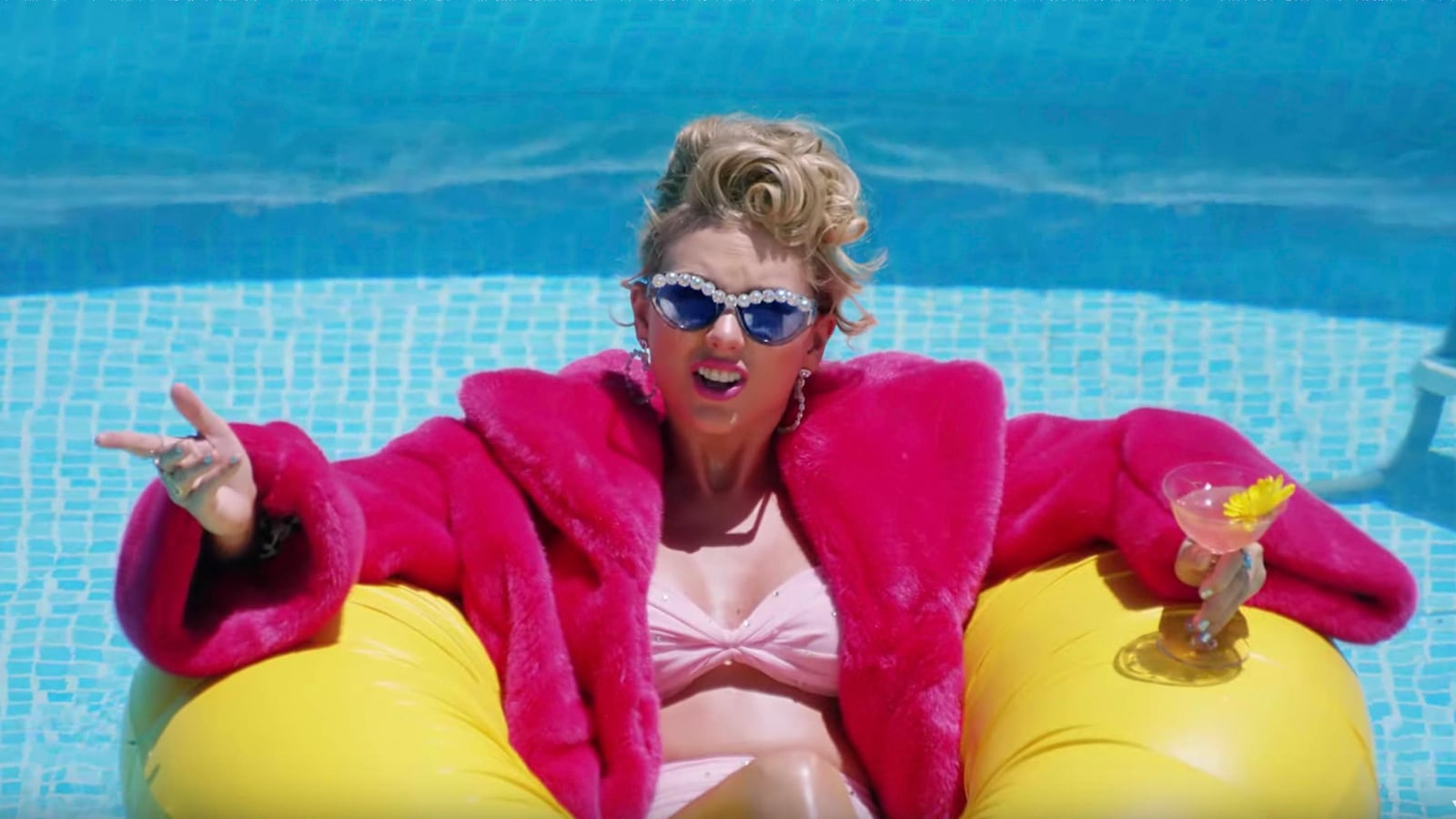On Monday morning, Taylor Swift released the music video for “You Need to Calm Down,” the second single off her upcoming album Lover.
The song is a classic T. Swift fuck-the-haters anthem, with a Pride month twist. In case you missed her impromptu performance at Stonewall Inn last weekend, Swift is a vocal ally now, standing up for all of her LGBTQ friends against the haters “comin’ at them like a missile.” The media response to the video was swift (pun intended) and impassioned, with people divided on how to feel about the pop star’s new politicized image. While some prominent queer media critics are skeptical of Swift’s embrace of the LGBTQ community, others appreciate that she is finally using her staggering influence for good. Since the video dropped, the internet has erupted into a debate over the line between allyship and appropriation.
The song’s confusing, albeit well-meaning, message left critics perplexed when it dropped late last week. One lyric, “Why be mad, when you can be GLAAD,” references the LGBTQ media monitoring organization, though you’d be forgiven for thinking instead of the Glad garbage bag commercials. She also borrows queer black slang, singing, “You just need to take several seats” and “Shade never made anybody less gay,” attempts at being woke that read more like the ramblings of a cringey relative who’s watched one episode of Drag Race.
The star-studded music video, which has racked up nearly 35 million views, opens with Swift waking up in a trailer park. The universe of the video features trailers painted every color of the rainbow, above-ground swimming pools, plastic flamingos, and impeccably-dressed drag queens. There are drag queens impersonating famous female divas, from Ariana Grande to Cardi B. Ciara officiates Jesse Tyler Ferguson and Justin Mikita’s wedding. The cast of Queer Eye hosts a tea party that would make the Mad Hatter jealous. Adam Lambert gives Ellen DeGeneres a tattoo. It’s Florida panhandle meets gay wonderland. There is even a Cher reference, because when Taylor Swift commits to something, she really commits.
And then there are the more controversial moments. The bullies Swift is imploring to calm down are anti-LGBTQ protesters, stereotyped as angry, cowboy-hat-wearing hillbillies who can’t spell. The video closes with a reconciliation between Swift and longtime rival Katy Perry—two straight women—detracting from the pro-gay-rights theme.
Still, Swift gets points for ending with a call to action encouraging viewers to “sign my petition for Senate support of the Equality Act on Change.org.” The petition now has more than 300,000 signatures and counting.
The shift to such overt political messaging feels like a complete 180 for Swift, who made headlines in the past for her reticence on social issues and was suspected of voting for Trump until she publicly endorsed Democratic candidates in the 2018 midterm elections. Her 2006 break-up song “Picture to Burn,” even features the homophobic lyrics, “So go ahead and tell your friends that I’m obsessive and crazy, that’s fine! I’ll tell mine you’re gay,” begging the question of sincerity. Has Swift truly had a civic awakening? Is she, as legions of queer fans have been speculating for years, preparing to come out as bisexual? Or is this all just an over-the-top, ill-advised promotional tactic? There’s a reason The Daily Beast’s Amy Zimmerman once dubbed Swift “our nation’s most opportunistic celebrity.”
In an article for Esquire titled “No Shade, But There’s a Wrong Way to Make a Gay Anthem,” Dave Holmes critiques the tone-deaf lyrics of “You Need to Calm Down,” while maintaining that he appreciates Swift’s effort and her recent financial and political support. “These days, LGBTQ wokeness is a box to check off in a marketing plan,” Holmes writes, “and when there are perfectly capable queer artists out there, sitting down as a straight person and setting out to write a gay anthem is very much like trying to give yourself a nickname.”
Others believe that Swift, who has a whole catalogue of songs devoted to condemning her critics and haters, is using “You Need to Calm Down” to conflate her experiences of being bullied online with the oppression of the LGBTQ community. Rebecca Jennings, a reporter at Vox, writes, “I have no doubt that criticism hurts her feelings, but it is not the same thing as the systemic hate faced by LGBTQ people or anyone else whose identities American culture disdains.”
On Twitter, commentators are taking more lighthearted jabs at the 30-year-old singer. Kevin T. Porter, one of the masterminds behind the Gilmore Guys podcast, tweeted, “Taylor Swift becoming an LGBT+ ally feels like my mom getting an Instagram.” Shannon Keating, who wrote an article for BuzzFeed News in April about #Gaylor conspiracies and queerbaiting, responded to the video by tweeting “so thankful to Taylor for inventing gay people.” Comedian Matt Rogers has turned Swift’s new image into an extended gag, creating a fake leaked track list for Lover that includes satirical songs like “Shantay Away,” “YAZ feat. Jonathan Van Ness,” and “Buttigieg 2020.” On Instagram, he has been sharing would-be cover art for the singles, including a poorly photoshopped photo of Swift and her former BFF/rumored romantic partner Karlie Kloss on a motorcycle.
Taylor Swift does deserve some credit for putting her money where her mouth is by making sizable donations to the Tennessee Equality Project and GLAAD. And her letter to Senator Lamar Alexander voicing her support of the Equality Act, which she shared on Instagram, sets an important example for young followers looking to get involved in politics. The idea that there is a wrong way to be an ally is complicated, and many of the think pieces written about “You Need to Calm Down” acknowledge the video’s significance for queer T. Swift fans and the boost in donations to gay rights organizations since its release. As Holmes writes in his article, “I am delighted for the young queer kid who’s hearing the song and feeling seen, supported, and nourished for the first time.” With two months until the release of Lover on August 23, it will be up to fans to decide if this is a case of better late than never or if it’s too little, too late.






